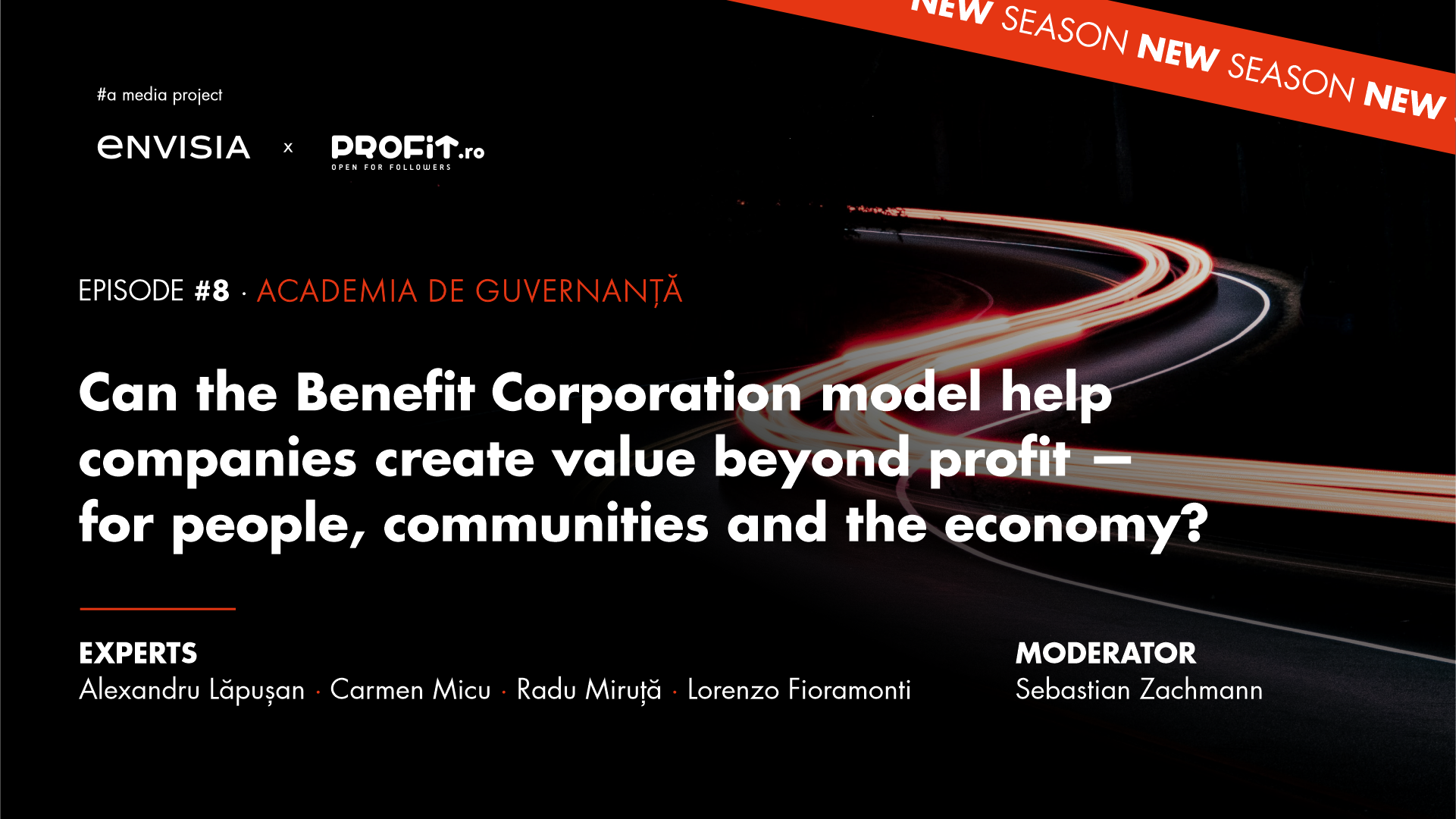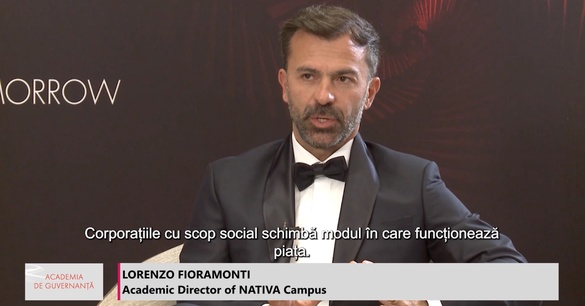Transforming Business through Benefit Corporations: Innovation, Purpose, and Potential for Romania

In this episode, Envisia proposes as a discussion topic an innovation in the field of governance: companies whose purpose is public benefit or public interest (benefit corporations) — a concept that changes the foundation of corporate governance by combining economic performance with social and environmental impact. Romania is in a moment of transition, and the direction it will follow depends on the alignment of entrepreneurs’ values, the commitment of leadership, and the adoption of sustainable, transparent, and accountable strategies at board level.
This was the theme of edition #8 of the Governance Academy, a media project created by Envisia, Profit.ro, and Prima News, in which Carmen Micu, CEO & co-founder of Envisia, Radu Miruță, Minister of Economy and Digitalization, and Alexandru Lăpușan, Vice President of Romanian Business Leaders and CEO of Zitec, together with Lorenzo Fioramonti, discussed the benefits, challenges, and future of the Benefit Corporation model. Moderator: Sebastian Zachmann.
What is a Benefit Corporation? Definition, Purpose Over Profit, and Legal Framework
According to Carmen Micu, a Benefit Corporation is a company oriented simultaneously toward financial performance and public benefit. It therefore assumes responsibility both toward shareholders and toward society and the community in which it operates.
“A company that serves the idea of public benefit is a company oriented toward profit, toward economic performance, and at the same time, to at least the same extent, it is oriented toward having a positive impact in society and in the community where it operates,” said Carmen Micu.

She explains that the Benefit Corporation (BC) model repositions corporate governance by integrating long-term vision and sustainability into the very decision-making architecture of the organization. In Romania, there is already a legal framework for a similar form — the social enterprise — which reinvests 90% of its profit for the community; however, this is not identical to the B Corp concept.
“B Corp has become well known lately. It is a global certification, not a legal concept, which evaluates the governance framework within which activity takes place, and all the qualitative aspects that impact that company’s sustainability,” she added.
Lorenzo Fioramonti, former Minister of Education in Italy and promoter of the concept, argues that public benefit corporations significantly change the traditional logic of the market as they focus on purpose over profit.
“Social-purpose corporations change the way the market functions. They essentially say that businesses have the responsibility to generate profit but also to generate social and environmental value,” said Fioramonti.
Benefit Corporation vs. B Corp: Understanding the Difference
The major difference between Benefit Corporations and companies that only apply CSR policies lies in how impact is measured, reported, and integrated into the decision-making process.
Lorenzo Fioramonti emphasizes that these organizations systematically assume responsibility toward society and the environment, and this makes them more attractive both to talent and to investors.
Carmen Micu adds that legislation regarding Benefit Corporations is already widely adopted in other countries and that Romania is in an advanced position in terms of appetite for B Corp certification:
“Italy, France, Spain, and 39 states in the United States have already adopted this legislation. As for B Corp-type certifications, Romania is ranked 4th in the world among countries rapidly moving toward the global top.”
“For leaders and boards, understanding the legal framework and the governance implications of a Benefit Corporation requires continuous preparation — legislation, ESG, circular economy, ethics, reporting. Without education, the model cannot be implemented correctly.”
The Core Innovation: Driving Sustainable Value Creation (ESG Focus)

Lorenzo Fioramonti highlights that public reporting of social and environmental impact helps rebuild trust in the business environment, enabling ESG and value creation.
“Social-purpose corporations can help a great deal in achieving this. They change responsibility not only toward the market, not only toward shareholders, but also toward communities and stakeholders in general,” he said.
Carmen Micu explains that the benefit corporation model brings advantages both to companies and to communities.
“State-owned companies are the perfect companies to become benefit corporations because the main mission of a state-owned company, meaning one owned by us, is to bring benefits to the citizens of Romania,” she said.
According to her, B Corp certification increases employee retention by 30%, attracts investment, and stimulates loyalty among young customers.
“Consumers prefer brands with positive impact from the category of benefit corporation companies, with trust and loyalty increased by 72%,” stated Carmen Micu.
The Potential for Romania: State, Policy, and the Business View
From a governmental perspective, the Minister of Economy, Radu Miruță, believes that Romania has major delays to recover in the area of governance of state-owned companies.
“Such a goal does not exist in most state companies. It is my challenge as minister to introduce it,” he said.

According to the minister, the reconfiguration of these organizations is hindered by institutional inertia and political legacies that affect competitiveness and profitability.
“I often notice that there are companies perhaps run with good intentions but by people who do not understand the field. And it is very complicated, if you are not knowledgeable, to undo all these arrangements and to have a growth target for profitability,” explained the minister.
Alexandru Lăpușan, Vice President of Romanian Business Leaders and CEO of ZITEC, notes that obtaining a B Corp-type certification involves real transformation, not a superficial image exercise.
“It’s like on an airplane. You have to put on your oxygen mask first and then help others. Therefore, obviously, a company that is in a problematic zone, financially speaking, can hardly manage to deal with these issues,” said Lăpușan.
He also highlights the role of talented employees, who choose projects with positive impact and help create a cycle of positive feedback. At the same time, B Corp certification helps companies improve their internal governance.
“We are currently in the certification process. The first technology company in Romania going through this certification process, and we hope to succeed,” he added.
Governance in a Benefit Corporation: Responsibility to Stakeholders
The transition toward a Benefit Corporation model is not an image exercise nor a bureaucratic formality. It is a deep transformation process that requires assuming responsibility for conducting the process, solid structure, and a real capacity to adapt to change, both within the organization and at the leadership level.

From an entrepreneurial perspective, Alexandru Lăpușan draws attention to the authenticity of this transformation and the real effort required to sustain it.
“If the team does not hold these values in any way, the mere intention of obtaining such a certification, I don’t really believe it will work. It is not a certification like others where you make a small effort and get the document. No, this process is really very serious and resource-consuming.”
From the perspective of public policy and the strategic direction assumed at state level, Radu Miruță emphasizes that real transformation can only come from an obsession with continuous adaptation and professionalization, in a technological context that is evolving rapidly.
“My answer is to be obsessed with adaptation and professionalization and technical expertise. Technically, technology is the one that has demonstrated it leads to progress. You must not stand still. Adaptation, in my view, is key.”
Carmen Micu completes this perspective, highlighting that any sustainable change begins with a clear redefining of the organization’s purpose and with a deep recalibration of strategy, supported by leadership education at the highest level.
“It is, essentially, about redefining the organization’s purpose. Redefining purpose, redefining objectives, a reconstruction and recalibration of strategy. Without education for executives and boards — in sustainable leadership, risk, non-financial reporting, collaborative governance — the company cannot make a real transition — it remains in greenwashing.”
Key Conclusions – Directions for the Future
- Benefit Corporation models combine economic performance with social and environmental impact, fundamentally changing the paradigm of corporate governance.
- Romania has a real opportunity to adopt this model quickly, but transformation requires financial health and values-driven leadership.
- Employees, consumers, and investors support organizations with measurable impact and responsible governance.
- Reforming state-owned companies remains a critical step, dependent on professionalization and the elimination of political influence.
- Transformation through the Benefit Corporation model is not just a trend, but a new architecture of global capitalism. It cannot exist without modern governance, educated leadership, and policymakers who understand that the legislation of the future must support the creation of economic and social value simultaneously.
Academia de Guvernanță – Dialogue for a Better Romania
A media project by Prima News, Profit.ro, and Envisia — Romania’s first business school dedicated to governance and the professionalization of board members. Every Friday at 8:00 PM on Prima News. Replays on Tuesday at 10:00 PM. Online at Profit.ro.
About Envisia
Envisia is Romania’s first business school dedicated to corporate governance and the professional development of board members. Through internationally accredited programs, masterclasses, and media initiatives like Academia de Guvernanță, Envisia helps shape leaders who turn good governance principles into performance and trust. Learn more at www.envisia.eu
Recommended articles
Digital Transformation & AI Governance
Leadership, Boardroom Dynamics & Crisis Response
Leadership, Boardroom Dynamics & Crisis Response
Governance & Board Effectiveness
Future of Boards & NED Careers
Future of Boards & NED Careers
ESG & Risk Oversight
Leadership, Boardroom Dynamics & Crisis Response
Governance & Board Effectiveness
Governance & Board Effectiveness
Leadership, Boardroom Dynamics & Crisis Response
Future of Boards & NED Careers
Governance & Board Effectiveness
Governance & Board Effectiveness
Governance & Board Effectiveness
Governance & Board Effectiveness
Future of Boards & NED Careers
Leadership, Boardroom Dynamics & Crisis Response
Future of Boards & NED Careers
 BACK TO ARTICLES
BACK TO ARTICLES
 Facebook
Facebook Linkedin
Linkedin
